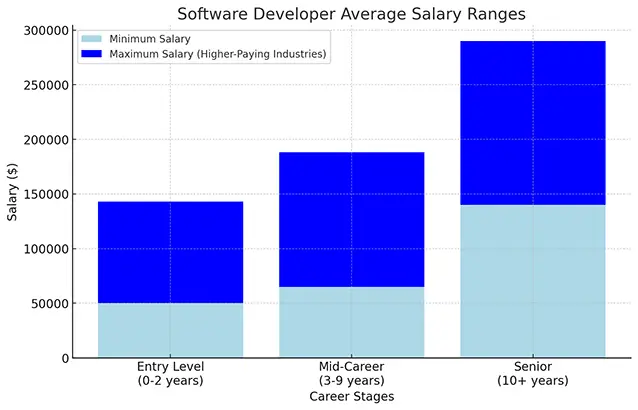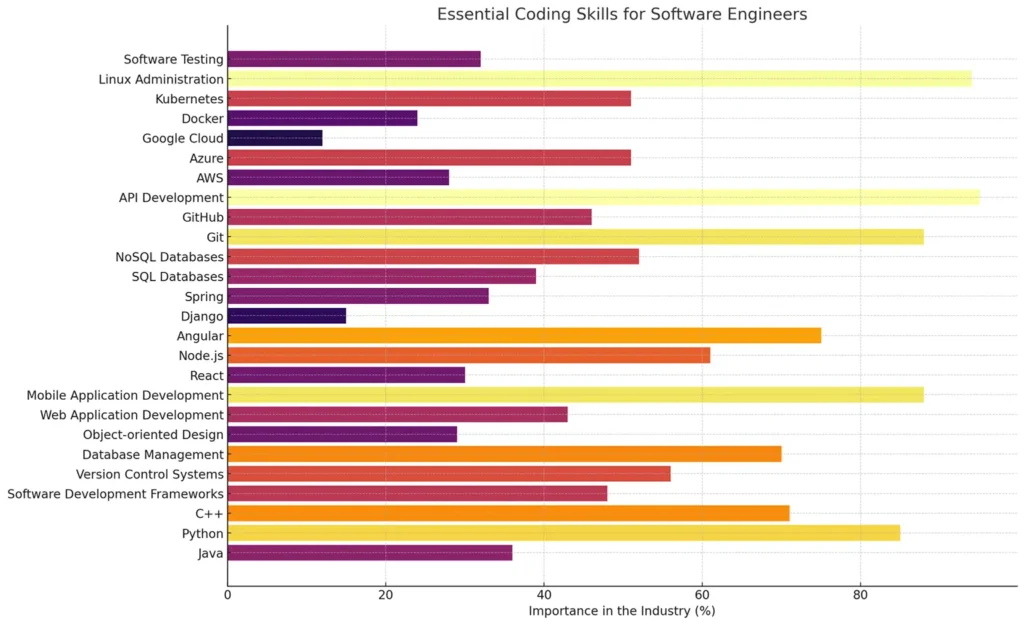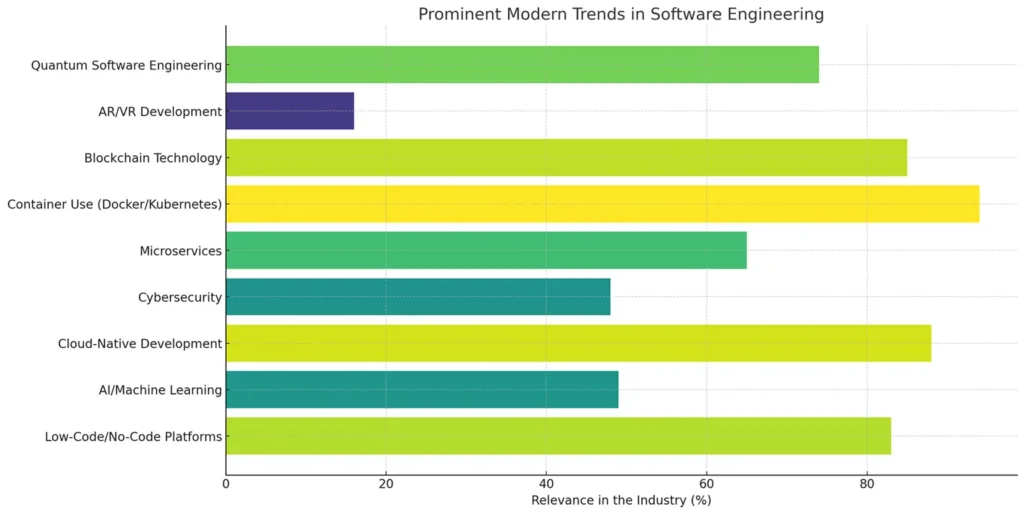
What is Software Engineering? A Look at This Exciting and In-Demand Tech Field
Software engineering is the area of computer science that focuses on applying engineering principles to design, develop, test, deploy, and maintain software applications and systems. Software engineers use programming languages, frameworks, tools, and methodologies to build reliable, high-quality software solutions that meet specific business or organizational needs and requirements.
Software engineers analyze, design, program, troubleshoot, debug, and upgrade complex software systems ranging from operating systems and middleware to applications and games, to name just a few.
A career in software engineering offers an exciting blend of intellectual challenges, constant learning, creativity, and the satisfaction of crafting innovative software products that have real-world impact. Those in this field can find opportunities across every industry, from cutting-edge tech companies to finance, healthcare, government, and more. As our world becomes increasingly technology-driven, the importance of skilled software engineers continues to grow. Emerging trends like artificial intelligence (AI), augmented/virtual reality (AR/VR), and the Internet of Things (IoT) are also fueling demand for software talent.
Software Engineering Overview
| Topic | Aspect | Description |
|---|---|---|
| Software Engineering | Definition | Area of computer science applying engineering principles to software design, development, testing, deployment, and maintenance. |
| Software Engineers | Role | Use programming languages, frameworks, tools to build software solutions; involved in design, programming, troubleshooting, debugging, and upgrading software systems. |
| Career Opportunities | Scope | Opportunities in tech companies, finance, healthcare, government; roles in development, system architecture, project management, technical consulting. |
| Emerging Trends | Key Trends | Focus on artificial intelligence (AI), augmented/virtual reality (AR/VR), Internet of Things (IoT), with increasing demand for software talent. |
| Daily Responsibilities | Common Tasks | Designing/coding solutions, testing, debugging, consulting, ensuring quality and compliance, team collaboration. |
| Earnings | Salary Potential | Varies by experience, industry, location; high demand leads to competitive salaries. Median annual salary over $110,000 (U.S. Bureau of Labor Statistics). |
| Essential Abilities | Skills for Success | Analytical skills, programming proficiency, problem-solving, communication, continuous learning. |
What Kind of Jobs Can You Get With a Software Engineering Degree?
A software engineering degree opens up a diverse range of job opportunities including roles in software development, system architecture, project management, and technical consulting. If you’re interested in the software engineer career outlook, here are some different roles below:
Types of Software Engineering Roles
- Software Developer: Write, update, test, and maintain application code and scripts
- Web Developer: Design, build, and support websites and web applications
- Mobile App Developer: Create applications for mobile devices and platforms
- Game Developer: Design and program video games, simulations, and entertainment software
- Software Architect: Plan and design the architecture of complex software systems
- Software Tester: Validate software to ensure proper functionality and quality
- Software Project Manager: Lead teams and oversee software projects from planning through deployment
What Are Some Specialized Software Engineering Career Paths?
Specialized software engineering career paths include areas like artificial intelligence development, cybersecurity, cloud computing, and mobile application development, each requiring specific technical expertise. Here are some more specialized roles below:
- Embedded Systems Engineer: Develop software for electronic devices and hardware systems
- Information Security Engineer: Implement and administer security measures for data, networks, and systems
- Machine Learning Engineer: Apply machine learning techniques to build intelligent, self-improving software
- Blockchain Developer: Build decentralized applications and solutions using blockchain
Unlock Your Future in Computer Science
Explore Jessup University’s Innovative Program Today!
What Does a Software Engineer Do on a Daily Basis?
What do software engineers do on a daily basis? Software engineers typically engage in designing and coding software solutions, testing and debugging programs, collaborating with cross-functional teams, and continually updating their technical knowledge. Here’s a bit more insight:
- Gather and evaluate user needs to determine software requirements
- Design architecture and workflow of software systems
- Write, update, debug, and test code for software programs and applications
- Identify and troubleshoot issues to improve software performance and user experience
- Consult with clients, engineers, IT specialists, and stakeholders throughout the development process
- Ensure software meets quality standards, best practices, and regulatory compliance
- Manage individual projects and collaborate with cross-functional engineering teams
- Keep up with the latest trends and technologies to apply them to development work
To perform these complex tasks, software engineers employ various programming languages like Java, Python, JavaScript, C++, C#, and more based on project needs.
How Much Can You Earn as a Software Engineer?

Earnings for a software engineer can vary significantly based on factors such as experience, industry, location, and expertise in high-demand specializations, with potential for highly competitive salaries. Software engineering offers excellent compensation potential thanks to high demand and specialized technical skills. According to the U.S. Bureau of Labor Statistics (BLS) in 2022, the median annual salary for software developers is over $124,200.
Salaries can vary based on factors like:
- Location (tech hubs tend to pay more)
- Years of experience
- Specific job role and industry
- Size of employer
Here are some software developer average salary ranges:
- Entry Level (0-2 years): $50,000 – $93,000
- Mid-Career (3-9 years): $65,000 – $123,000
- Senior (10+ years): $140,000+
Higher-paying industries like software publishing, finance, and manufacturing tend to boast average salaries approaching $150,000 or more for senior developers.
What Abilities Do You Need to Succeed as a Software Engineer?
To succeed as a software engineer, essential abilities include strong analytical skills, proficiency in programming languages, creative problem-solving, effective communication, and a continuous learning mindset. To tackle complex development challenges, software engineers rely on a diverse mix of technical understanding and soft skills. Here are just some skills for software engineering, including:
Technical Skills
- Fluency in multiple programming languages like Java, JavaScript, C++, Python
- Proficiency with operating systems, networks, and hardware
- Understanding of core computer science concepts like data structures, algorithms, and complexity theory
- Knowledge of development best practices, architectural patterns, and design principles
- Experience with software debugging, testing, maintenance, and deployment
- Cloud computing expertise
- Machine learning and artificial intelligence literacy
Soft Skills
- Analytical thinking and stellar problem-solving abilities
- Creativity and aptitude for innovation
- Communication, emotional intelligence, and teamwork
- Time management and organizational skills
- The drive to continuously upgrade skills and keep learning
What Coding Skills Should Aspiring Computer Software Engineers Learn?

Aspiring computer software engineers should learn coding skills in languages like Java, Python, and C++, as well as grasp software development frameworks, version control systems, and database management. Here are some of the most essential programming-related skills and technologies an aspiring or new software engineer should master:
- Object-oriented design and programming
- Web application development (front-end and back-end)
- Mobile application development
- Popular frameworks like React, Node.js, Angular, Django, Spring, etc.
- SQL and NoSQL databases
- Source control with Git and GitHub
- API design and development
- Cloud computing with AWS, Azure, or Google Cloud
- Containerization with Docker and Kubernetes
- Linux Administration
- Software testing principles and frameworks
Building real personal projects to practice these concrete engineering skills greatly enriches your learning beyond a formal degree program.
Will There Be Software Engineering Jobs in the Future?
The availability of software engineering jobs in the future is expected to increase due to ongoing digital transformation across industries, advancements in technology, and the growing need for innovative software solutions. Essentially, the future outlook for these careers is exceptionally bright. According to the U.S. Bureau of Labor Statistics (BLS), employment of software developers and related roles is projected to grow 25% from 2022 to 2032 – more than 3 times the average across all occupations.
As technology expands into nearly every facet of business and society, hundreds of thousands of developer jobs will be needed to craft innovative software solutions. The rise of cutting-edge tech like robotics, quantum computing, biotechnology, and Phygital systems will drive further demand for skilled software talent over the next decade.
What Are Some Key Facts About Software Engineering?
Key facts and statistics about the vibrant field of software engineering:
- There are over 1.6 million software developers employed in the U.S. currently
- In 2022, 43% of developers worked in fully-remote positions
- The highest salaries are in tech states like California ($157,000) and Washington ($152,000)
- Globally, there are over 26 million professional software engineering positions
- India has the most software developers internationally, with approximately 5 million
- Back-end engineers usually earn more than front-end developers
- Roughly 20% of software engineers are women, although this ratio is improving
As these figures demonstrate, software engineering teams encompass a vast community of diverse professionals that continue to multiply each year.
Recent Trends Reshaping the Software Engineering Landscape

Like most technology fields, the software industry moves quickly, with new advancements arriving constantly. Here are some of the most prominent modern trends software engineers need to follow closely:
- Rise of Low-Code/No-Code Platforms: Empowering citizen developers to build apps with little/no coding
- Artificial Intelligence: Will AI replace software engineering? Incorporating AI to automate tasks and create innovative features is the wave of the future
- Shift to Cloud-Native Development: Building specifically for cloud environments like AWS, Azure and GCP
- Focus on Cybersecurity: Implementing security best practices throughout coding and deployment
- Adoption of Microservices: Deconstructing monoliths into smaller, loosely-coupled services
- Increased Use of Containers: Leveraging Docker, Kubernetes, and cloud container tools
- Advancement of Blockchain Technology: Creating decentralized apps and blockchain-based solutions
- AR/VR Breakthroughs: Developing immersive augmented and virtual reality experiences
- Quantum Software Engineering: Crafting quantum algorithms to unleash computing advances
Keeping up with seismic changes like these (and more) allows aspiring software engineers to tailor their skills toward the most valuable disciplines.
How Does Jessup University Prepare You to Become a Software Engineer?
Jessup University prepares students to become software engineers through a comprehensive curriculum that blends theoretical computer science education with practical application, ethical considerations, and industry-relevant skills.
Educational Pathways for Budding Computer Scientists
Are you considering a career in software engineering? Jessup University’s Bachelor of Science in Computer Science presents an in-depth program that fuses theoretical foundations with practical application. With in-person and online learning options, our approach is adaptable to various educational preferences, allowing students to excel in their chosen format.
In-person attendees will benefit from 15-week courses, immersive community involvement, and comprehensive resource access. Those opting for the online route can take advantage of shorter, 7-week courses, flexible scheduling, and six annual start dates. This program offers specializations in Cybersecurity, Data Analytics, Data Science, Information Technology, and Software Engineering, providing a customized educational journey whether you’re on campus or studying from afar.
Jessup University’s Program Focus Areas and Principal Courses:
Cybersecurity (Online Only)
- Introduction to Cybersecurity
- Cybercrime and Governance
- Contemporary Cybersecurity
- Network and System Security
- Cyber Forensics
Data Analytics (Online Only)
- Foundations of Data Analytics I & II
- Data Analytics Principles & Techniques I & II
- Data Analytics Practicum
Software Engineering Concentration
- Mobile Computing
- Web Stack Technologies
- Data Structures & Algorithms 2
- Database Systems
…and more.
Crucial Skills for Success in Computer Science
What is computer science? It’s the field of study that focuses on computation, information, and automation using computers and computational systems. It’s the backbone and foundation behind the success of software developers and software engineers, and can lead you many directions within the tech space.
See, prospering in the ever-changing field of computer science is tied to a robust skill set. Jessup University’s program stresses expertise in advanced programming languages, proficiency in modern software development methodologies, and effective technical communication.
The curriculum deepens understanding of computational challenges, their requirements, and constraints. Additionally, it embeds a Christian ethical outlook towards technology, preparing graduates to be proficient and morally responsible in their field.
Whether participating in on-campus activities or via online modules, students are equipped to deploy their skills in various professional settings, armed with our Computer Science degree.
Jessup University Software Engineering Education
| Topic | Aspect | Description |
|---|---|---|
| Jessup University Program | Focus | Prepares students for software engineering careers through a curriculum that combines computer science theory with practical application and ethical considerations. |
| Educational Pathways | Program Options | Bachelor of Science in Computer Science with specializations in Cybersecurity, Data Analytics, Data Science, Information Technology, Software Engineering. |
| Program Specializations | Examples | Cybersecurity, Data Analytics, Data Science, Information Technology, Software Engineering. |
| Program Structure | Learning Formats | Offers in-person and online learning options; includes 15-week courses for in-person and 7-week courses for online with multiple start dates annually. |
| Skills Development | Curriculum Focus | Emphasizes programming languages, operating systems, networks, core computer science concepts, software testing, cloud computing, AI and ML literacy. |
| Career Preparation | Graduate Competencies | Equips students with technical skills, ethical outlook, problem-solving abilities, and readiness for diverse software engineering roles. |
| Industry Relevance | Skills Application | Focuses on real-world application of skills through internships, industry connections, and postgraduate employment opportunities. |
We’ve Explored the Full Scope of Software Engineering
We’ve examined the full scope of software engineering, from its fundamental concepts to the extensive possibilities it offers. Software engineering is more than an academic pursuit; it’s a bridge to the future, a means to build a world where innovation and ingenuity merge effortlessly.
Picture yourself leading the charge, crafting the software solutions of tomorrow. What advancements will you create? How will you transform lives? The world of software engineering overflows with potential. Your ideas have the power to change the world.
If you’re curious and ambitious, now is the time to actualize your dreams. Jessup University is where your passion for software engineering can evolve into an inspiring vocation. Contact us today to discover how you can embark on this dynamic career journey.
Unlock Your Future in Computer Science
Explore Jessup University’s Innovative Program Today!
More Engineering & Technology Articles
-

How Many Programming Languages Should a Software Engineer Know?
Learning to code and deciding which programming languages to focus on can be an overwhelming task for aspiring software engineers. With new languages emerging all…
-

What Do Software Engineers Do on a Daily Basis?
What is software engineering? Software engineering is the area of computer science that applies engineering principles to design, develop, test, deploy, and maintain software applications and systems. …
-

Software Engineer Career Outlook: 2024 and Beyond
What is software engineering? Software engineering is the computer science area that applies engineering principles to design, develop, test, deploy, and maintain software applications and systems. The…
